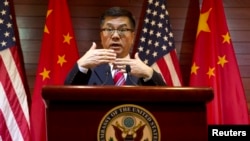U.S. Ambassador to China Gary Locke, who leaves office Saturday, warned against provocative actions by Beijing and Tokyo, who are involved in a heated territorial dispute.
Ambassador Locke's comments, which also included criticism on China's alleged human rights violations, came Thursday during his final news conference at the U.S. Embassy in Beijing.
"We call on both sides to avoid any type of actions that would be deemed provocative, that would raise tensions. The last thing we need is some unintended incident that leads to unintended consequences," said Locke.
Locke said the fallout could be "very severe" if, for instance, a fishing boat bumped into a navy vessel and someone drowned.
Both sides in recent months have scrambled fighter jets and sent patrol boats to monitor each other's presence near a group of disputed islands in the East China Sea.
During his two years as ambassador, Locke has faced accusations that the U.S. supports its ally Japan's claim to the islands -- a notion he again rejected on Thursday.
Locke was tasked with helping expand the relationship between the world's two largest economies. He said he departs "with a spirit of optimism," believing the U.S.-China relationship is "positive and indeed will shape the future of the world."
But, as he did in a speech on Wednesday, Locke also slammed Beijing for its crackdown on those who criticize the Chinese Communist Party, many of whom have been jailed in recent years.
Locke said Chinese citizens have in recent decades seen an increase in the quality of life and standard of living, but he stressed that "human rights is more than economic prosperity."
Specifically, he raised the case of prominent Uighur scholar Ilham Tohti, who was formally charged this week with separatism related to his comments on China's policies in the far-west region of Xinjiang.
Locke said he was "very concerned" about the case, echoing a statement by the U.S. State Department on Wednesday.
Beijing's foreign ministry on Thursday said the comments were a "gross interference with China's internal politics and legal sovereignty," stressing that Tohti is "suspected of committing a crime."
Locke is the first Chinese-American to serve as the U.S. ambassador to Beijing. He often drew headlines in China for his relatively humble, everyman demeanor that stood in contrast to the lavish lifestyle of many Chinese leaders.
He is being replaced by veteran lawmaker Max Baucus. The 72-year-old senator from the northwestern state of Montana has limited China experience, but a record of taking a tough stance on controversial Chinese trade practices.
Ambassador Locke's comments, which also included criticism on China's alleged human rights violations, came Thursday during his final news conference at the U.S. Embassy in Beijing.
"We call on both sides to avoid any type of actions that would be deemed provocative, that would raise tensions. The last thing we need is some unintended incident that leads to unintended consequences," said Locke.
Locke said the fallout could be "very severe" if, for instance, a fishing boat bumped into a navy vessel and someone drowned.
Both sides in recent months have scrambled fighter jets and sent patrol boats to monitor each other's presence near a group of disputed islands in the East China Sea.
During his two years as ambassador, Locke has faced accusations that the U.S. supports its ally Japan's claim to the islands -- a notion he again rejected on Thursday.
Locke was tasked with helping expand the relationship between the world's two largest economies. He said he departs "with a spirit of optimism," believing the U.S.-China relationship is "positive and indeed will shape the future of the world."
But, as he did in a speech on Wednesday, Locke also slammed Beijing for its crackdown on those who criticize the Chinese Communist Party, many of whom have been jailed in recent years.
Locke said Chinese citizens have in recent decades seen an increase in the quality of life and standard of living, but he stressed that "human rights is more than economic prosperity."
Specifically, he raised the case of prominent Uighur scholar Ilham Tohti, who was formally charged this week with separatism related to his comments on China's policies in the far-west region of Xinjiang.
Locke said he was "very concerned" about the case, echoing a statement by the U.S. State Department on Wednesday.
Beijing's foreign ministry on Thursday said the comments were a "gross interference with China's internal politics and legal sovereignty," stressing that Tohti is "suspected of committing a crime."
Locke is the first Chinese-American to serve as the U.S. ambassador to Beijing. He often drew headlines in China for his relatively humble, everyman demeanor that stood in contrast to the lavish lifestyle of many Chinese leaders.
He is being replaced by veteran lawmaker Max Baucus. The 72-year-old senator from the northwestern state of Montana has limited China experience, but a record of taking a tough stance on controversial Chinese trade practices.





